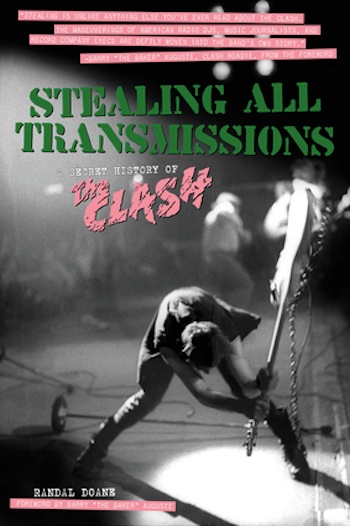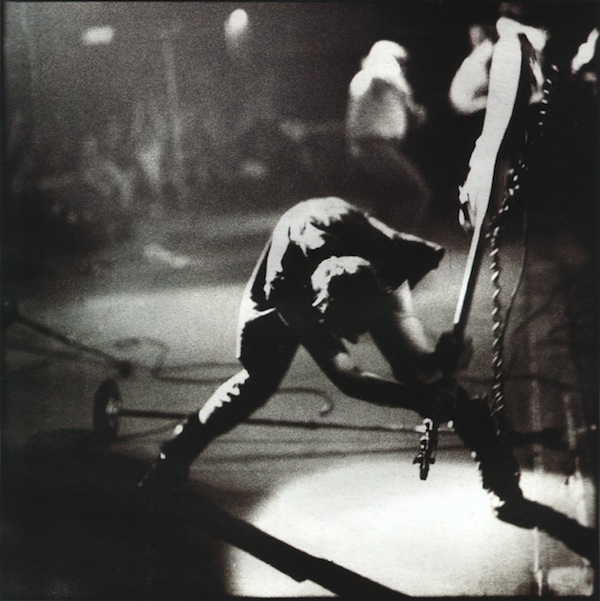Book Review: “Stealing All Transmissions” — How The Clash Conquered America
Stealing All Transmissions is slim, but nearly every page is filled with insight and originality.
Stealing All Transmissions: A Secret History of the Clash by Randal Doane. PM Press, 192 pages, $15.95.
By Adam Ellsworth

Books about the Clash are typically weighty affairs. Oral history coffee table book The Clash is nearly 400 pages and tips the scales at approximately five pounds. Chris Salewicz’s Redemption Song: The Ballad of Joe Strummer is more than 600 pages long, while Marcus Gray’s Route 19 Revisited: The Clash and London Calling focuses primarily on just one album and still tops out around 500 pages.
And then on the other end of the spectrum there’s the new Stealing All Transmissions: A Secret History of the Clash by Randal Doane. Discounting its foreword, notes, and index, the tome is only a shade more than 130 pages in length but pound for pound, it’s one of the best things anyone has ever written about the group. It’s at least in the same league as the brilliant Route 19 Revisited.
“This is the story of how The Clash loved America, and how America loved them back,” Doane writes in the book’s opening pages.
Really, Stealing All Transmissions is more centered on New York City than the country as a whole, though that’s no tragedy. NYC was the center of American punk, so it’s only right that a book about the greatest of all the British punk bands (not to mention the greatest of all the punk bands period) should concentrate there. Joe Strummer, Mick Jones, Paul Simonon, and Topper Headon are all given their proper due by Doane for the role they played in their own stateside popularity, but where this telling of the tale is more original is the author’s highlighting of the deejays and music journalists who helped out along the way.
“Serendipity rarely simply happened,” Doane writes of the Clash’s U.S. success. “It needed nurturing from doting figures in retail, print, and on the radio.”
Those doting figures included deejays Meg Griffin and Joe Piasek and freeform New York City FM radio stations WNEW and WPIX. At a time when most stations were playing the Eagles and Fleetwood Mac, it was these stations and deejays that went in the other direction and broadcast the sound of punk and new wave across the five boroughs. “Stealing all transmissions” indeed. Credit is also given to “The Dean of American Rock Critics” Robert Christgau, who at the time was writing for the Village Voice. Not only did Christgau champion the Clash’s debut album, he also informed his readers where in the city they could buy it (the legendary Bleecker Bob’s) long before it was officially released in this country, thus helping to make The Clash the best-selling import record in U.S. history.
The efforts of these characters and others were undoubtedly successful and as Doane states, this meant the Clash had a larger American audience straight out of the gate than most British punk and punk-inspired bands of the late ’70s As a result, the band played their first New York City shows—in February, and again in September, 1979—at the prestigious Palladium, while other groups, including the Police, had to start out at smaller nightclub venues. Stealing All Transmissions pays special attention to the group’s second and third New York/Palladium shows, held September 20 and 21, for at least two important reasons: 1) the September 21 show was broadcast live on WNEW, one of the stations instrumental in breaking the band in the city, and 2) it was at one of these shows that arguably the most famous rock and roll photograph of all time was taken—Pennie Smith’s iconic shot of Paul Simonon smashing his bass on the stage, which would be used as the cover of the group’s classic third album, London Calling.

When was this iconic photograph of The Clash’s Paul Simonon taken?
So, at which of these two shows was the photo taken? While history has long recorded the date as September 21, Doane makes a convincing case that perhaps history has been wrong all these years. And though it doesn’t necessarily “matter” when the picture was taken, if Doane’s hypothesis is correct then there’s some new and interesting context to consider when looking at the legendary image.
In addition to the novel angle of the work and its bass-smashing revelations, Stealing All Transmissions is also finely written, although it does at times read more like a long academic journal article than a book (Doane’s day job is assistant dean at Oberlin College, so perhaps this is inevitable). Regardless, this style never takes away from the content itself, so it’s only barely worth mentioning. Stealing’s only true bum note comes when Doane offers a “cinematic” interpretation of London Calling. He rightfully points out that the double record is not a concept album, and then he offers a reading of it that presents the group “as a single, peripatetic protagonist, wandering the avenues and alleys of London and New York, picking up stories and sounds in al fresco cafes, in movies in Times Square, and behind barricades in Brixton.” This reading is forced and incomplete. It’s also unnecessary. London Calling is what it is, and there’s no need for a storyline to be placed on it, even if that storyline is only there to point at larger truths.
Excluding this one weak spot, Stealing All Transmissions is a wonder of a book. Slim, yes, but nearly every page is filled with insight and originality. It sets a high bar for the many more volumes that will undoubtedly be written about the Clash in the years ahead.
Adam Ellsworth is a writer, journalist, and amateur professional rock and roll historian. His writing on rock music has appeared on the websites YNE Magazine, KevChino.com, Online Music Reviews, and Metronome Review. His non-rock writing has appeared in the Worcester Telegram and Gazette, on Wakefield Patch, and elsewhere. Adam has a MS in Journalism from Boston University and a BA in Literature from American University. He grew up in Western Massachusetts, and currently lives with his wife in a suburb of Boston. You can follow Adam on Twitter @adamlz24.
Tagged: PM Press, Randal Doane, Stealing All Transmissions
